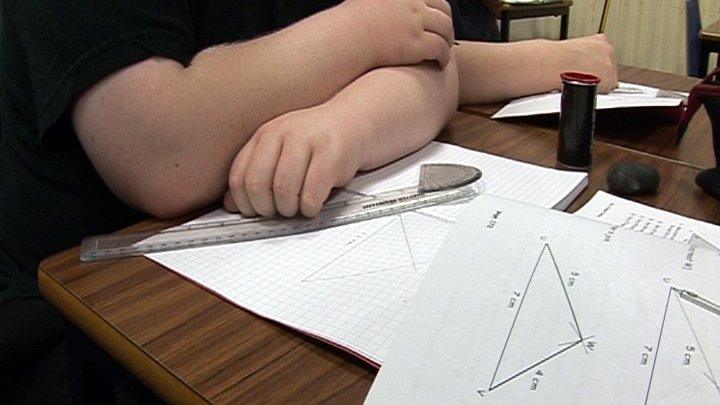Can councils save on education budgets?
- Published

With council budgets under pressure, can local authorities save on their education budgets?
Education is the single biggest service councils provide.
It accounts for roughly £5bn of the £11bn councils across Scotland spend between them every year.
The education budget overall is not ring-fenced. Councils can decide exactly how much to spend but in many respects their hands are tied.
The two biggest parts of the education budget are staffing costs and the school estate.
With each year of austerity, it becomes harder for councils to identify fresh savings. The easier or less controversial a savings option, the earlier it might be looked at.
Highland Council is looking at saving £64m by 2019 - almost as much as it has already saved over the past five years. Its consultation lists a huge number of options - from grass cutting and recycling to bin collections and the public toilets. The number of staff could fall by 1,000. But ways of saving money on education are also being explored.
But just how practical might this be?
Rural areas
With staff costs, councils' hands are effectively tied: pay and conditions for teachers are set nationally and there is an agreement with the Scottish government to maintain the ratio of staff to pupils. Cutting class sizes in the early years of primary school is also a national priority.
Meanwhile closing schools - especially in rural areas - is difficult, controversial and takes time. Crucially, schools cannot be closed on financial grounds - councils have to demonstrate that their proposals could actually benefit a child's education.
This means savings in the education budget are harder to find.
Highland Council is currently proposing shortening the school day by 30 minutes for pupils in Primary's 4, 5, 6, and 7.
It believes it can save up to £3.2m a year by doing this. That is because additional teachers have to be engaged if primary-aged children spend more than 22 hours 30 minutes a week in school.
Schools have to be open for 190 days each year but it is up to the council to decide the length and structure of the individual school day.
However, it is also possible to look at saving money by spreading school hours over 4.5 days a week - as happens in some areas including Edinburgh and the Borders - which can help reduce the cost of running buildings.
Another option concerns the number of teachers in secondary schools - cutting their number by 1% (equivalent to 15 staff) could save £600,000 but would mean fewer subjects would be on offer at some schools, especially for youngsters studying for Highers and Advanced Highers.
But, because teachers cannot be made redundant, this would simply mean that some teachers who retired or left naturally would not be replaced.
School funds
The council is also consulting on whether more "distance learning" would be appropriate, especially for senior pupils - potentially saving £600,000 a year. The idea might be that where a particular subject is not available at one school, pupils who want to study it can tap into the resources at another.
Reducing the number of schools is still an option - potentially saving £850,000 a year - although no new school closures are currently singled out.
Although it is not specifically mentioned in Highland Council's consultation, one way of keeping the education budget in check is simply to reduce everyday expenditure: for instance the budget for new books and equipment.
The problem with this is that while spending on, for instance, new desks in a particular school could be delayed for a year with little adverse effect, over time the condition of classrooms and materials deteriorates as a backlog builds up.
One option suggested by East Renfrewshire Council - which has some of the most academically successful schools in Scotland - involves using pupils to help run school libraries.
Another question is whether parents or Parent Teacher Associations may end up helping to pay for things which might previously have been paid for out of school funds.
This might include paying for trips, additional sports equipment or new library books.
There would be no question of ever asking a parent to pay directly for important classroom materials. But the Scottish Parent Teacher Council is currently surveying its members to find out what kind of things parents and PTAs are being asked to help fund.
There is also anecdotal evidence of teachers using their own money to buy materials to help make lessons more interesting - such as posters.
- Published11 November 2014

- Published28 October 2014
